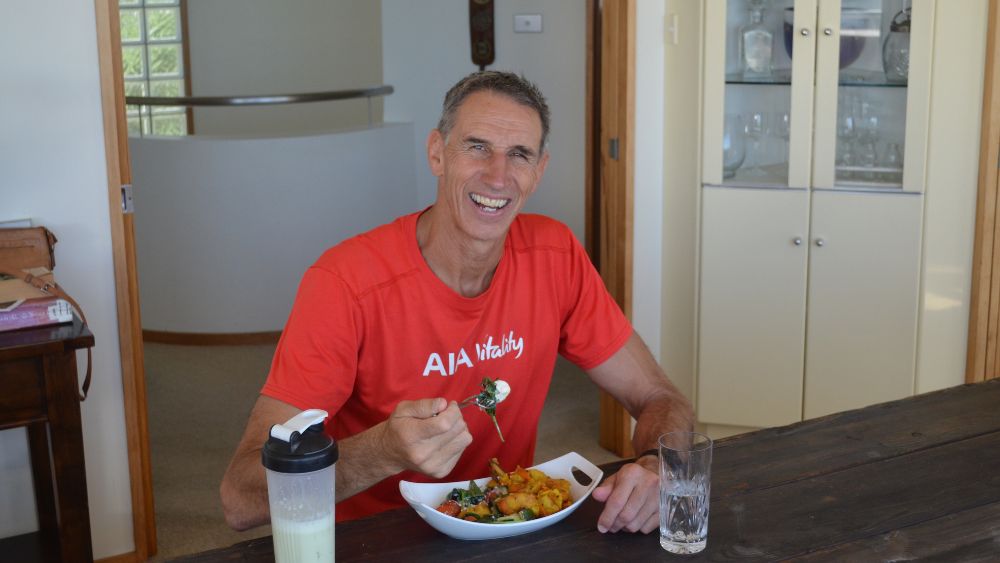To help with this, we spoke with personal finance expert Tom Hartmann. As a member of Te Ara Ahunga Ora Retirement Commission (which translates as ‘the way to developing wellbeing’) and personal finance lead for Sorted, Tom knows the impact financial stress can have on our overall wellbeing.
Money is a top cause of stress for many New Zealanders. According to data released by the Financial Services Council in April, Kiwis are increasingly worried about money with 50 percent worrying daily or weekly - an increase of 300,000 people since last year. 59 percent say that financial issues have affected their overall wellbeing which is up from 53 percent in 2022. Young New Zealanders are disproportionately affected, with 64 percent of respondents aged 37 or younger, worrying about money daily, weekly or monthly, which is more than any other age group1.
So, what is financial wellbeing?
Unlike financial wealth, financial wellbeing is about having the freedom to make financial decisions that benefit and improve your quality of life. On one hand, these include being able to meet your day-to-day financial obligations like paying rent, your mortgage or putting food on the table. On the other, it's about being prepared for unexpected expenses, growing your savings and getting on track for your longer-term goals like buying a house or retiring.
Tom says it’s about making choices for your money, as opposed to your money making choices for you. To help make this happen and improve your financial wellbeing, Tom says planning is key.
“Money touches so many aspects of our lives, so putting a financial plan in place can lead to reducing anxiety,” says Tom.
Financial planning
Being proactive with money management by having a plan is particularly important at the moment, with more and more Kiwis navigating challenging financial times. This includes budgeting, tackling debt, setting financial goals and managing expenses.
Wondering where to start? Sorted outlines 6 steps to help Kiwis take control of their money and leave their financial worries behind. Check them out below:
- Start your emergency fund
- Get your Kiwisaver on track
- Tackle your debt
- Cover your money, people and stuff
- Work out your retirement number
- Set your goals, then reach them!
Having an understanding of where your money is going, is another fundamental element of good financial management. Tom says that it's important to know the flow of your income and expenses, to effectively grow your financial health. According to Tom, the most important element of this is giving “each dollar a job to do.” While some of those jobs involve keeping a roof over your head, paying the power bill and putting food on the table, Tom says another job to consider is your financial goals.
“Most goals require money and a plan - all of us need a plan for the income we have coming in.”
Tools to help you
There are a number of tools available for tracking your finances. These include Pocketsmith which provides forecasting, scenario testing and budget tracking, and the Goodbudget money tracking app, which makes it easy to keep track of your spending using a digital envelope system. These tools help provide a clear picture of your spending patterns, identify unnecessary expenses and enable allocation of funds towards saving or investment goals.
Referencing advice from Sorted, Tom says “budgets are not there to help you make ends meet, they’re there to help you flow as much money as you can towards your goals and what’s important to you.
“Having a crystal-clear picture of your expenses, creating a new plan with new financial goals, then checking how you’re tracking on that new plan, will help you reach those goals.”
Growing your savings
Tom also stressed the importance of regular saving. Sorted recommends a technique called “paying yourself first”, which means before paying bills and buying necessities, you funnel some money towards a separate savings account, ideally automatically. Tom says that once you have that system in place, “it’s set and forget” with your savings automatically building in the background. It’s a system that ensures a greater possibility of hitting your goals.
What brings you joy?
While it’s important to prepare for the future, Tom says that New Zealanders must also consider their personal happiness and life satisfaction in relation to their spending habits.
“Go through expenses that are non-essential and give them a rating from 1 to 5, the latter being what brings you the utmost joy, and 1 is for the things that make you feel terrible afterwards. You should be able to cut out anything that is a 3 or below without feeling deprived,” says Tom.
This expense rating system outlined by Tom allows you to allocate more money towards the important things that make you feel good.
Being prepared for a rainy day
We also discussed the importance of an emergency fund with Tom. An emergency fund is money set aside as a financial safety net for unexpected expenses such as car repair, a trip to the vet or emergency surgery. Sorted recommends saving up a starter emergency fund of $1,0002.
According to Tom, that $1,000 helps to avoid getting into debt to get through an emergency. For those wanting to create a fully-fledged emergency fund, you should aim to set aside three to six months’ worth of expenses.
Saving for retirement
We asked Tom how soon New Zealanders should look at starting to save for retirement and investing in a KiwiSaver plan. According to Tom, starting early, around age 18, is best to ensure you have access to the government's financial incentives and that you are making the most of your employer contributions.
KiwiSaver allows you to save for two key life moments, a first home purchase and retirement. For more information on the benefits of KiwiSaver, check out the Sorted rundown on how it works and why it's worth joining.
Insurance
On choosing what insurance to invest in, Tom says it’s important to first analyse your individual insurance needs.
“It’s important to look at the risks you carry and what each insurance product will do for you and your risks. Products make sense at different stages of life to get the peace of mind you want.’ says Tom.
For example, with dependents or people who rely on you for financial support, like children and elderly parents, it’s worth investing in income protection and/or trauma insurance so they can still thrive even if you’re not able to work.
At AIA, we offer both Trauma Insurance and Income Protection Insurance. Trauma insurance can provide financial support to cover your needs, such as taking care of medical treatment and rehabilitation costs, or allowing you and your family to focus on recovery instead of worrying about work. Income Protection Insurance ensures that should you face an illness or injury which prevents you from working, you receive regular monthly payments to cover your ongoing financial commitments such as household bills, mortgage or rent payments.
It’s important to speak to a trusted adviser when considering insurance options. If you don’t have an adviser, you can request a call back from AIA and we’ll put you in touch with an adviser in your local area who specialises in the type of insurance you’re interested in.
Finally, we asked Tom for his top tips for people trying to be better with their money in 2023. Check them out below:
- Try to get through this time with as little debt as possible - there will be times when borrowing is necessary, but if we can get through the year with as little debt as possible, New Zealanders will be in a better position for the future.
- When making a financial plan or budget, give every dollar a job to do - ensure that this is in keeping with your financial goals.
- Keep your spending happy - prioritise the things that bring you joy.
For those who make an effort to budget effectively and maximise their finances, but are still struggling to pay for necessities, Tom says one of the best resources is the free helpline MoneyTalks - 0800 345 123. Tom recommends reaching out, even anonymously, for personalised support from financial mentors working in locations all throughout Aotearoa New Zealand. They provide advice to anyone who is struggling with financial debt, or those who want to plan more effectively for the future.
For further information and support, Sorted offers New Zealanders free, impartial information to help manage money throughout life through comprehensive guides and free online tools.
Footnotes:
- https://7422267.fs1.hubspotusercontent-na1.net/hubfs/7422267/FSC%20Corporate/Documents/Research%20Reports/FSC%20Research%20Report%20-%20Financial%20Resilience%20Index%202023.pdf?__hstc=98444288.649e122080787bf1a191dfb0c3cca894.1658365457323.1681425566395.1683153997715.56&__hssc=98444288.4.1683153997715&__hsfp=3675171845&hsCtaTracking=f1281f5f-ce20-4088-a887-7375fccfa911%7C8b4672e4-87be-4cf4-9eb8-696fb1f45c2c
- https://sorted.org.nz/6-steps-to-get-your-money-sorted/start-your-emergency-fund






